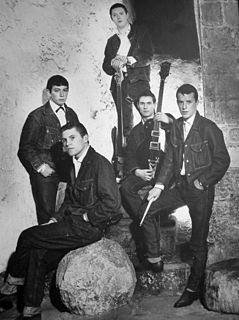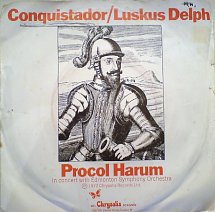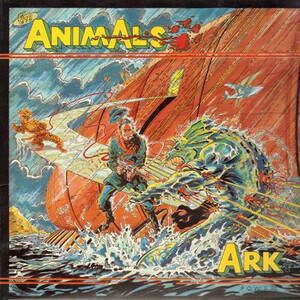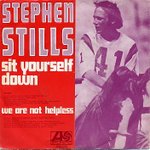Related Research Articles

The Animals are an English rhythm-and-blues and rock band, formed in Newcastle upon Tyne in the early 1960s. The band moved to London upon finding fame in 1964. The Animals were known for their gritty, bluesy sound and deep-voiced frontman Eric Burdon, as exemplified by their signature song and transatlantic number-one hit single "The House of the Rising Sun" as well as by hits such as "We Gotta Get Out of This Place", "It's My Life", "Don't Bring Me Down", "I'm Crying", "See See Rider" and "Don't Let Me Be Misunderstood." The band balanced tough, rock-edged pop singles against rhythm-and-blues-oriented album material and were part of the British Invasion of the US.

Eric Victor Burdon is an English singer-songwriter and actor. He was previously the vocalist of rhythm and blues and rock band the Animals and funk band War. He is regarded as one of the British Invasion's most distinctive singers with his deep, powerful blues-rock voice. He is also known for his aggressive stage performances.

"Ring of Fire" is a song written by June Carter Cash and Merle Kilgore and popularized by Johnny Cash in 1963. The single appears on Cash's 1963 album, Ring of Fire: The Best of Johnny Cash. The song was originally recorded by June's sister, Anita Carter, on her Mercury Records album Folk Songs Old and New (1963) as "(Love's) Ring of Fire". "Ring of Fire" was ranked #4 on CMT's 100 Greatest Songs of Country Music in 2003 and #87 on Rolling Stone's list of The 500 Greatest Songs of All Time. In June 2014, Rolling Stone ranked the song #27 on its list of the 100 greatest country songs of all time.

"After the Love Has Gone" is a single by Earth, Wind & Fire released in 1979 on ARC/Columbia Records. The song reached No. 2 on both the US Billboard Hot 100, behind The Knack's "My Sharona" and the US Billboard Hot R&B Singles chart, No. 4 on the UK Pop Singles chart and No. 3 on the US Billboard Adult Contemporary Songs chart. "After the Love Has Gone" has also been certified Gold in the US by the RIAA and Silver in the UK by the BPI.

"Sky Pilot" is a 1968 song by Eric Burdon & the Animals, released on the album The Twain Shall Meet. When released as a single the song was split across both sides, due to its length (7:27). As "Sky Pilot " it reached number 14 on the U.S. pop charts and number 15 on the Canadian RPM chart.
"In Another Land" is a song by the Rolling Stones, released in December 1967 as the first single from the album Their Satanic Majesties Request, and credited solely to Bill Wyman. In America, London Records released it as a single a week before the album.

Victor Harvey Briggs III was a British blues and rock musician, best known as the lead guitarist with Eric Burdon and The Animals during the 1966–1968 period. Briggs, a convert to Sikhism, later played classical Indian and Hawaiian music, and adopted the name Antion Vikram Singh Meredith.

The discography of The Animals, an English music group of the 1960s formed in Newcastle upon Tyne, contains 20 studio albums, six compilation albums, five EPs and 25 singles. Featuring a gritty, bluesy sound and a deep-voiced frontman in Eric Burdon, they are best known for their rendition of an American folk song named "House of the Rising Sun", which is described by many as their signature song. This single had worldwide sales of nearly 5 million and became a Number One hit in both the UK and US in 1964. Overall, the group balanced tough, rock-edged pop singles such as "We Gotta Get Out of This Place" and "It's My Life" against rhythm and blues–oriented album material. The Animals released separate UK and US albums, a practice common to other British Invasion bands of the time such as The Beatles and The Rolling Stones.

"It's My Life" is a song written by Brill Building songwriters Roger Atkins and Carl D'Errico. The song was originally performed by English R&B band The Animals, who released it as a single in October 1965.

"Spill the Wine" is a 1970 song performed by singer Eric Burdon and the band War. It was released as a single in May 1970, backed by the non-album track "Magic Mountain", and was War's first chart hit.

"Conquistador" is a song by the English rock band Procol Harum. Written by Gary Brooker and Keith Reid, it originally appeared on the band's 1967 self-titled debut album. It was later released as a single from the band's 1972 live album Procol Harum Live: In Concert with the Edmonton Symphony Orchestra. It is one of the band's most famous and popular songs and their third Top 40 hit on the U.S. Billboard Hot 100, peaking at number 16.

The Greatest Hits of Eric Burdon and The Animals was the group's compilation representing the Animals' last three lineups, and showcased their venture into psychedelic rock. It was released in March 1969 in the US but never put out in the United Kingdom; it was the last album MGM Records would release in the group's lifetime. Despite containing three tracks that had been US Top 15 singles, the collection was not commercially successful, placing only at number 153 on the Billboard 200.
"San Franciscan Nights" is a 1967 song performed by Eric Burdon and The Animals. Words and music were composed by the group's members, Eric Burdon, Vic Briggs, John Weider, Barry Jenkins, and Danny McCulloch. A paean to San Francisco, it was the biggest hit that the new band – as opposed to the first-incarnation Animals of the mid-1960s – would have. It reached a peak position of number 1 on the Canadian RPM charts, number 9 on the U.S. pop singles chart, and number 7 on the UK pop singles chart.

Ark is an album by the original members of the Animals. Released in 1983 on I.R.S. Records, it peaked at #66 on the Billboard Top 200. "Ark" was the second and last reunion attempt of the band's initial lineup. The album subsequently was followed by a tour by the band.

Every One of Us is an album by Eric Burdon & The Animals. It was released in 1968 on MGM Records.

Daniel Joseph "Danny" McCulloch was an English musician best known as the bassist of the 1960s psychedelic rock group Eric Burdon and The Animals.

"You'll Accomp'ny Me" is a song written and recorded by American rock singer Bob Seger. It appears on his album Against the Wind.

"Fanny " is a song written and performed by the Bee Gees for their Main Course album in 1975. It was the third single release from the album, peaking at number 12 on the United States Billboard Hot 100 chart and number two in Canada. According to Maurice Gibb, producer Quincy Jones called "Fanny" one of his favorite R&B songs of all time.

"Willie and the Hand Jive" is a song written by Johnny Otis and originally released as a single in 1958 by Otis, reaching #9 on the Billboard Hot 100 chart and #5 on the Billboard R&B chart. The song has a Bo Diddley beat and was partly inspired by the music sung by a chain gang Otis heard while he was touring. The lyrics are about a man who became famous for doing a dance with his hands, but the song has been accused of glorifying masturbation, though Otis always denied it. It has since been covered by numerous artists, including The Strangeloves, Eric Clapton, Cliff Richard, Kim Carnes, George Thorogood and The Grateful Dead. Clapton's 1974 version was released as a single and reached the Billboard Hot 100, peaking at No. 26. Thorogood's 1985 version reached No. 25 on the Billboard Rock Tracks chart.

"Sit Yourself Down" is a song written by Stephen Stills that was released on his 1970 solo debut album Stephen Stills. It was also released as the second single from the album, following the Top 20 hit "Love the One You're With." and reached the Top 40, peaking at #37.
References
- ↑ "Eric Burdon and the Animals - Anything".
- ↑ "Winds of Change charts and awards". Allmusic . Retrieved 2012-01-23.
- ↑ Eder, B. "Winds of Change". Allmusic . Retrieved 2012-01-23.
- ↑ "Spotlight Singles" (PDF). Billboard. March 30, 1968. p. 72. Retrieved 2021-02-23.
- ↑ "CashBox Record Reviews" (PDF). Cash Box. March 30, 1968. p. 24. Retrieved 2022-01-12.
- ↑ "Anything". Songfacts.com. Retrieved 2010-12-24.